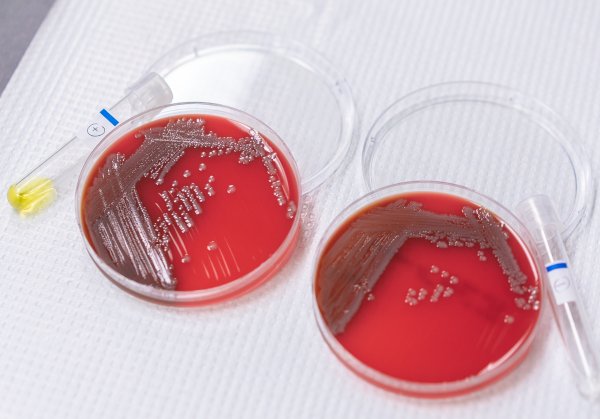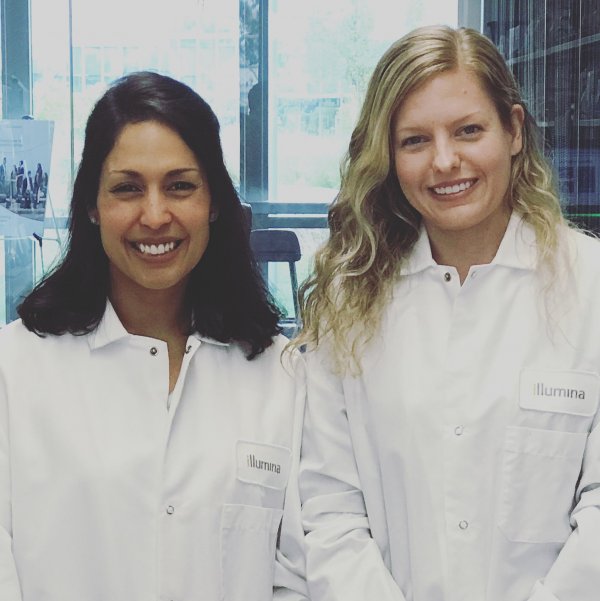Q&A: BioAmp Diagnostics partners with Illumina Accelerator to validate UTI test
15 May 2019
Written by Dr. Tara deBoer, BioAmp Diagnostics
Both Dr. Tara deBoer and Dr. Nicole Tarlton from the University of California (UC), Berkeley have dedicated much of their scientific careers to working on scientific projects at the interface of basic research and health, with Nicole spending the past eight years of her research efforts in the space of antimicrobial resistance. The global public health threat of antimicrobial resistance has, and continues, to motivate both Tara and Nicole to combine technical forces to develop diagnostic technologies targeted at mitigating the rise of antimicrobial resistance.
In this Q&A, we chat with Tara to gain a better understanding of this fantastic partnership.
How did you end up getting involved in each other’s work and in the Longitude Prize?
The dearth of diagnostic tests capable of directing evidence-based treatment practices for urinary tract infections (UTIs) has contributed to the significant overuse and inappropriate use of antibiotics. While working towards the development of a core diagnostic technology at UC Berkeley, I began closely collaborating with infectious disease specialist Dr. Nicole Tarlton, who provided a great depth of knowledge regarding the clinical utility of the target diagnostic test. Strong collaborative efforts between Nicole and I, with the support of UC Berkeley colleagues, contributed to the accelerated delivery of the DETECT diagnostic technology. DETECT was designed to be robust, rapid, and scalable, with the aim of creating a diagnostic test that can be easily adapted to meet the needs of users around the world. With this in mind, it became clear that our mission as a team was in alignment with the scope of the Longitude Prize.
What type of diagnostic test are you developing and who is it for?
The first product we plan to commercialise is a point-of-care (POC) diagnostic test that detects a resistance biomarker (extended-spectrum ß-lactamase [ESBL]) that can occur in bacteria that cause high-risk UTIs. The presence of an ESBL indicates that the bacterium is resistant to typical first-line antibiotics that medical providers use to treat these infections.
Our test will inform the use of appropriate antibiotics in cases where a patient is infected with a multidrug-resistant bacterium, and will ideally be used helping medical providers in emergency departments who treat a large-proportion of high-risk UTI patients.
– Tara Deboer, Bioamp Diagnostics –
The target test format is a simple reagent-based test that will be run on existing automated chemistry analysers found in clinical laboratories, yielding actionable results in minutes. This format would integrate well into the workflow of EDs/laboratories caring for a large number of patients. To run the test, urine would simply be transferred into a sample tube (similar to the tube that blood is collected in for a blood test), and then the tube would be placed on the automated chemistry analyser line, where the colour-changing indicator solution would be delivered into the sample tube. In less than 30 minutes the sample would be analysed and results could then be relayed to a medical provider through a medical records system, much like standard lab results are now. A positive or negative test result would indicate the presence or absence of resistance, empowering the medical provider with the information needed to define the appropriate antibiotic treatment for a patient immediately. The timescale of the time-to-results that DETECT can offer is in stark contrast to the current diagnostic standard, which can take upwards of 3 days.
You are focusing on a niche set of patients, why not try to include all urinary tract infections?
One of the significant barriers that diagnostic companies face in the development of a meaningful diagnostic test is the resistance to test adoption. Therefore, it is very important to define the population of medical providers that represent the largest pool of early-adoption evangelists who find your test to be essential to improving the treatment of their patients.
Interestingly, in our early market research efforts there was varying interest in a diagnostic test for the treatment of uncomplicated UTIs. While there is an obvious impact to be made from minimising the misuse and inappropriate use of antibiotics in this instance, the barrier to adoption for the providers that commonly care for this patient population appears to be considerably greater than with those caring for higher-risk UTIs. For this reason, we elected to first focus our efforts on developing a test that will assist in the treatment of high-risk UTIs, where concern for appropriate antibiotic treatment is greatest. With a lower adoption barrier, a greater number of patients will be impacted by the use of the test. However, the implementation of our first test for the indication of high-risk UTIs is just a stepping-stone.
Bioamp will expand indications of the test in the future to reach a broader range of patients, including patients suspected of having an uncomplicated UTI.
– Tare Deboer, Bioamp Diagnostics –

In what environments do you see this test eventually being used?
Point-of-care (POC) testing is a relative term. While “near-patient” POC tests, tests that are run at a patients bedside, are preferred in resource-limited settings, such a test format would not be conducive to the current workflows implemented in high-resource areas that experience high patient volumes.
Our first test will be directed at helping medical providers in emergency departments in the US that care for >50,000 patients per year, because they treat a large-proportion of all high-risk UTI patients. As such, we are working to first commercialise a POC test that meets the needs and constraints of this representative hospital archetype.
What do you see as your biggest hurdles to overcome before you apply for the Longitude Prize?
A significant hurdle that we recognise is the development of a sound commercialisation plan. Specifically, manufacturing represents an area that we are working to de-risk and establish strong partnerships and advisory support. In our efforts to move towards full-scale manufacturing and commercialisation, we are actively working with regulatory, IP, and quality systems specialists to construct a plan that will prepare us to execute the development of our first target diagnostic test, and successful design of this plan will prepare us to submit our application for consideration.

Congratulations on your recent acceptance into Illumina Accelerator. Can you tell us more about the work you intend to do with them?
Illumina Accelerator is a premier company creation engine focused on supporting start-up companies that have the potential to expand the power of genomics. The need to understand the genetic profiles of resistance and the mechanisms of gene transfer within and across bacterial species motivated us to seek this opportunity. At Illumina Accelerator, we will have access to a number of sequencing platforms as we work to execute a large-scale study that will be directed at validating the intended use of our first diagnostic product. Additionally, Illumina Accelerator offers capital and access to capital, mentorship and coaching, and strong community support as we work to overcome the huge challenges that we face as a diagnostics start-up. We are thrilled to have the opportunity to work with this amazing team beginning May 2019.
What do you hope to achieve over the next few years?
As a company, it is our ultimate vision to offer a suite of diagnostic tests that will enable a precision medicine approach for the treatment of infectious diseases.
In the immediate future, we are working to develop strong regulatory, reimbursement, and manufacturing plans that will maximise our resources and minimise our time to development.
By the end of this year, we aim to solidify the intended use of our first diagnostic test, execute a clinical outcomes study, and work towards designing a healthcare economics study to better understand the financial impact that our test could deliver to hospitals.
Lastly, we are currently expanding as a company, and are excited for the opportunity of building a diverse and interdisciplinary team driven to develop accurate, accessible and clinically impactful diagnostic tests to medical systems around the world.
BioAmp Diagnostics is a Longitude Prize Competitor, more details here.
Illumina Accelerator Invests in Four Startups for Ninth Cycle.
